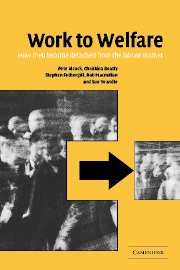Book contents
- Frontmatter
- Contents
- List of figures
- List of tables
- Notes on the authors
- Preface
- List of abbreviations
- Part I The context for labour market detachment
- Part II New evidence from the UK
- 4 The detached male workforce
- 5 Incapacity Benefit and unemployment
- 6 The over 50s
- 7 Family, life course and labour market detachment
- 8 The role of health in labour market detachment
- 9 Getting by
- 10 Back to work?
- Part III The policy implications
- Appendix: Research methodology
- References
- Index
6 - The over 50s
Published online by Cambridge University Press: 22 September 2009
- Frontmatter
- Contents
- List of figures
- List of tables
- Notes on the authors
- Preface
- List of abbreviations
- Part I The context for labour market detachment
- Part II New evidence from the UK
- 4 The detached male workforce
- 5 Incapacity Benefit and unemployment
- 6 The over 50s
- 7 Family, life course and labour market detachment
- 8 The role of health in labour market detachment
- 9 Getting by
- 10 Back to work?
- Part III The policy implications
- Appendix: Research methodology
- References
- Index
Summary
The relationship of older men to the labour market is of particular interest and importance. As we saw in ch. 4, men aged 50–64 form by far the largest group that has become detached from employment. As Campbell (1999) has documented, in the UK during the 1980s and 1990s the increase in the number of older men without jobs was especially rapid. Only a minority of men in their early 60s, approaching state pension age, now remain in employment.
The prevailing perception is undoubtedly that labour market detachment among these older men is synonymous with early retirement. It is not hard to see why this view has taken root. In many professional jobs – teaching, the civil service and local government are good examples – pension schemes set 60 as the normal retirement age many years ago. As pension schemes have gradually become the norm in other occupations, including large parts of the private sector, they, too, have often adopted 60 as the retirement age. Increasingly it is only an unfortunate minority, mainly in insecure manual jobs and outside the scope of occupational pension schemes, who are required to work on until they are 65.
Added to this, employers have often used early retirement as a means of slimming down their workforce. Men in their 50s are frequently seen as an easy target. They can be expensive to retain, because their salaries have risen with seniority and experience.
- Type
- Chapter
- Information
- Work to WelfareHow Men Become Detached from the Labour Market, pp. 140 - 161Publisher: Cambridge University PressPrint publication year: 2003
- 1
- Cited by

